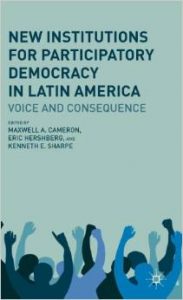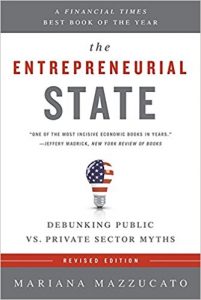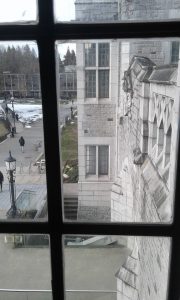
“Constitutional questions are first and foremost not questions of right but of power” (Ferdinand Lassalle)
“…But what is left of democracy?” (Wendy Brown)
Background
After ten years of political stability and one of the broadest social reform agendas implemented in its history under President Rafael Correa government, Ecuadorian people voted in a historic referendum, which will have an enormous impact on the country´s institutional and social future. Thanks to President Correa´s, the quality of Ecuadorian democracy was strengthened in areas of equity between 2007 and 2017; the rate of poverty dropped from 37.6% to 22.5% and according to the Gini index the rate of inequality dropped from 0,54 to 0,47.
During the Correa administration, there existed a strong political will to recover and rebuild the State from the ashes of the neoliberalism era and to foster a more participatory democracy.
After Lenin Moreno, once the former Vice President of Correa became elected in April 2017, the political spectrum turned to the right as President Moreno started to descorreizar the country. To “descorreizar” Ecuador, President Moreno launched his referendum initiative arguing that his reasons were mainly to fight against corruption in State institutions and to reactivate the economy, so then he initiated an entire reform of “control” institutions.
It is difficult to define what descorreizar the country means precisely. This has been a term used by those political forces against former President Correa to says is aimed to dismantling the institutional arrangement created by the Constitution of 2008, which is associated solely with President Correa´s style of government. Moreover, President Moreno has begun to dismantle the economy and social policies implemented by former President Correa´s coalition, which are focused on inclusion and redistribution of wealth and social resources. In addition, it has been claimed that corruption was widespread during the Correa administration because all the power had concentrated in his hands.
The referendum issued by President Moreno consisted of seven questions in total, including one a presidential reelection ban, one on the elimination of the Plusvalia Act, and one on a substantial reform of the Council for Citizen Participation and Social Control (“CPSC”).
The Government received a positive response to seven questions of 60% while 36 % of electors voted “No” on the three questions mentioned in the previous paragraph. Currently, the new referendum policies are being executed diligently by the different state actors with the full support of mass-media as well as and traditional political forces of all political spectrums and the elites.
In spite of the positive “public opinion” regarding President Moreno´s proposed changes, reforming the CPSC which Montecristi´s Constitution consider as the “holy grail” of the new accountability and “check and balance” system, is simply a means for President Moreno to gain full control of the State power, at which point he can become the leader of an authoritarian regime.
The reform of the Council for Citizen Participation and Social Control and its Transition
The government´s reason for the proposed amendment to the Constitution is that the Council for CPSC needs to be reform because the former Council has not fulfilled its mandate. The proposal indicates that, through the amendment, new council members will be elected by the people thereby increasing the legitimacy of this branch of government.
In the meantime, the Council has to be replaced by a transition Council in which members are nominated entirely by the executive and designated by the Assembly and will have the complete authority to replace the control authorities over a period of six months -Ombudsperson, Public Defender, National Prosecutor, Comptroller, Electoral Council, Electoral Court.
The CPSC was an innovation in terms to give citizens’ voice an institutional channel to increase the participatory democracy and as a different way to design the accountability and check and balances mechanisms (1). In this sense, the Ecuadorian Constitution reflects Bolivarian constitutionalism, in which Simon Bolivar suggested such a social contract was necessary as it as the necessity to create and develop a moral power in the society capable of promoted and cultivated cultural transparency sense among citizens. Bolivar believed that our Republics had to promote the common good through its political arrangements: “let us give our Republic a four branch of government aimed to educate the kids and the people hearts, the public spirit, the customs and the republican moral.” (2)
Under the Constitution, the CPSC has to fulfill three crucial functions: promote the participatory democracy mechanism; promote the transparency and social control among common people; enable a process in which the control authorities, electoral branch, and judicial council are selected on merits and citizens base on approval mechanisms.
When this “transition” mechanism was criticized, President Moreno simply replied in an interview “The Ecuadorian people know I am not a liar. So I ask them to have faith in me”. However, one of the citizen´s main concerns has been was how this situation might represent a threat to horizontal accountability mechanisms, as the executive branch will directly nominate the new transition Council members.
The new Council members have now been chosen, and the Council for the transition has started its work. In contrast to the former Council where there was greater diversity, the new Council is composed of six males as well as only one indigenous male and just one female.
As mentioned above, this Transition Council will have the authority to evaluate current control authorities and to designate new ones. Hence, one of the main concerns of this proposal is, as there is a link between the members’ designation and the Government, the new control may not be able to fulfill their duties independently and ethically. Ironically, this was one of the main criticisms of the Council during President Correa´s administration– its attachment to the executive.
With that said, the second part of reform could eventually be beneficial in terms of democratic participation. One of the positive aspects of the government’s proposal is that new Council members should be elected every four years through popular vote. The success of the reform will depend on its implementation, and on how political actors, citizens, and social organizations will respond to it. This new election mechanism could potentially give more legitimization to the Council and give citizens the opportunity to citizens to engage and learn more about the new participatory framework. However, one of the risks associated with the electoral mechanism could be how to ensure that not only the powerful and elite can have a seat on the Council.
It is important to stress that the CPSC was designed as kind of “holy grail” in the 10-year-old Ecuadorian constitutional system, and served independently to ensure checks and balances were maintained. Today, it is difficult to envision a scenario where Ecuadorian political parties -starting with the Moreno government will not be tempted to seize greater power for their own benefit. Ecuadorian political history shows a pattern where political actors were not respectful of their power limitations and tried to reshape other branches of government to serve their agendas. If that pattern repeats itself once again, the “medicine” proposed to deal with the “politicization problem” of this Council is likely to be worse than the alleged illness.
The new transition Council has started its functions facing severe challenges. The first problem has revolved around the extension of its current power. Here, public and scholarly opinions are divided. Some people argue that because this is a “transition” time, the transition Council must have extraordinary powers. Other sectors say the Council must fulfill what people voted for in the Referendum, and there is no signal of people will give the transition Council extraordinary powers.
Indeed, the Council members – except for one its members- currently stated they have extraordinary powers, and they have started to evaluate even the Constitutional Court, launching a warning to the highest tribunal that if the Court does not accept the CPSC ´s evaluation, members of the Constitutional Court will be replaced. However, the Constitution states that the CPSC does not have the power to replace members of the Constitutional Court. Similarly, when the CPSC fired the Ombudsperson after his show of opposition, the Council designated a new Ombudsperson without any public input as was required on the Referendum.
Despite this constitutional debate, the Council President -an old guard conservative politician- says that because of this “transition” time, he has “extraordinary” powers, even if the Constitutional norms do not support his thesis, the CPSC norms will prevail. This constitutional interpretation is completely arbitrary and even was opposed by one of the council members. What the new Council president is saying is that the CPSC could be above Constitutional order and the Rule of Law, and could start to exercise its power in an authoritarian manner.
The bypass of horizontal accountability mechanisms and some procedural problems associated with this Referendum initiative
Despite the Presidential constitutional faculty to announce a Referendum this particular initiative of President Moreno spurred a controversial debate regarding its constitutional legitimacy because the Constitutional Court – a crucial institution of horizontal accountability– was bypassed and not allowed to exercise control over the whole process (3).
Generally, Referendums are a way to engage citizens in Direct Democracy logic and are used to achieve different goals, sometimes to vote on sensitive issues, however, bypassing institutional checks and balances through executive powers can be problematic. Referendums initiatives should be designed as a way to strengthen citizens´ voice and power (4).
One of the problems associated with Referendums that scholars have detected is that complex political topics may be reduced to yes and no questions, as in the recent Ecuadorian Referendum case. In addition, the government and its new political allies were afraid of President Correa´s influence during the campaign, so they did not spend adequate time promoting a serious debate in order to engage citizens. Moreover, the way questions were framed in the Referendum was misleading, which shows a lack of fair play.
The OAS electoral mission prepared a report highlighting the lack of constitutional control over this Referendum initiative: “if this referendum initiative would have a constitutional control before many of the challenges would have been avoided”.
Chronicle of a Political Crisis Foretold?
Was the Referendum really meant to strengthen either the participatory democracy and social transparency mechanisms in Ecuador, or was mainly used as a legitimization strategy to boost government power and its allies in pursuit of their political agendas and interests? It is too early to determine these answers with 100 percent accuracy.
At this moment, it is a fact that President Moreno´s Government, the new Council, the mass-media, the elites and the new majority at the Assembly are working aggressively to fulfill the plan to “descorreizar” the country. We could observe how Moreno and his allies have designed and are implementing a sophisticated strategy to fulfill the main objective, where there is no difference between the discourse of the Government´s secretary of communication and the editorials or interview show across mass-media. Private mass-medias want to get rid of the Communication Act or any democratic regulation over their power so they will support the Government agenda wholeheartedly.
As part of this plan, the governing coalition hasn´t had any problems challenging the Constitution or the democratic norms. Indeed, in one short year, we have observed how a democratic elected vice-president was “guillotined” under a clear case of “Lawfare”, the President of the Parliament was also replaced in an illegal way; the Ombudsperson was fired after asking the CPSC to respect the due process of law. Lastly, the comtropller started a legal persecution against President Correa for his sovereign policies surrounding the external debt.
This kind of Blitzkrieg (“Guerra relámpago”) strategy against Rafael Correa´s social and democratic legacy seems to be working at the perfection until now. However, the Council could face its biggest proof when it challenges the Constitutional Court.
As pointed out before, if the transition Council assumes the extraordinary power to evaluate and reorganize the Constitutional Court, this could lead to an intense power struggle (“Choque de trenes”) between the two institutions. At this moment, the Constitutional Court has to decide when to give in Council ´s power or to rescue the Constitutional order from an authoritarian path that Moreno and his coalition started to walk. We could observe two possible scenarios here:
Scenario one: the Constitutional Court decides to exercise its full control and take an ex-post constitutional control. Here the goal would be aimed at assessing whether the whole Referendum was or not Constitutional or just issue a decision limiting the power of the transition Council. The first situation could lead to a the political crisis because the actions of the Government and its allies may be declared unconstitutional. In this casem we could enter into a very uncertain political arena. If the second action were taken, the Council will see limitations to its power and seriously affected President Moreno agenda.
Scenario two: The Council decides to use its “extraordinary” attributions to end the mandate of the Constitutional Court, and to start designating new members directly. This move has the full support of President Moreno who has indicate in tv message connection he will support every decision taken by the Council. However, from a constitutional point of view, this would represent one of the worst breakdown of the Rule of Law in Ecuadorian history. In this case, from a legal point of view only an emergency mechanism review by the Interamerican Human Rights Court could save Ecuadorian from the authoritarian regime.
At the parliamentary level, Moreno has lost his early political allies since he decided to break with his electoral constituents and shift toward the support of right-wing parties. This is also problematic in terms of the stability of his government. Because of the new alliance with the right-wing parties, Moreno has to make serious concessions in his governmental plan, the one which won the elections. In other words, this represents another constitutional infraction, which could open the door to a possible “recall” during the second year of his mandate.
We have observed in Ecuador a very catastrophic political scenario over the past year, which leads to the question: Are we facing the chronicle of a political crisis foretold? Everyone who knows the Ecuadorian political history and the way our elites and right-wing forces operate can agree with Gabriel García Marquez “There Had Never Been a (Political Crisis) More Foretold”.
References:
(1) New Institutions for Participatory Democracy in Latin America: Voice and Consequence. Cameron, Maxwell.
(2) Angostura Speech. Bolivar, Simon.
(3) Mauricio Guim & Augusto Verduga, Ecuador’s “Unstoppable” Constitutional Referendum, Int’l J. Const. L. Blog, Dec. 16, 2017, at: http://www.iconnectblog.com/2017/12/ecuadors- unstoppable-constitutional-referendum
(4) The Rise of Referendums: Elite Strategy or Populist Weapon?, Topaloff, Journal Of Democracy.










